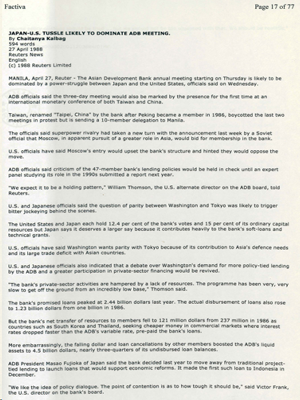JAPAN-U.S. TUSSLE LIKELY TO DOMINATE ADB MEETING
[Reuters]
Published date: 27th Apr 1988
27 April 1988
Reuters News
English
(c) 1988 Reuters Limited
MANILA, April 27, Reuter – The Asian Development Bank annual meeting starting on Thursday is likely to be dominated by a power-struggle between Japan and the United States, officials said on Wednesday. ADB officials said the three-day meeting would also be marked by the presence for the first time at an international monetary conference of both Taiwan and China. Taiwan, renamed “Taipei, China” by the bank after Peking became a member in 1986, boycotted the last twomeetings in protest but is sending a 10-member delegation to Manila. The officials said superpower rivalry had taken a new turn with the announcement last week by a Soviet official that Moscow, in apparent pursuit of a greater role in Asia, would bid for membership in the bank. U.S. officials have said Moscow’s entry would upset the bank’s structure and hinted they would oppose the move. ADB officials said criticism of the 47-member bank’s lending policies would be held in check until an expert panel studying its role in the 1990s submitted a report next year. “We expect it to be a holding pattern,” William Thomson, the U.S. alternate director on the ADB board, told Reuters. U.S. and Japanese officials said the question of parity between Washington and Tokyo was likely to trigger bitter jockeying behind the scenes. The United States and Japan each hold 12.4 per cent of the bank’s votes and 15 per cent of its ordinary capital resources but Japan says it deserves a larger say because it contributes heavily to the bank’s soft-loans and technical grants. U.S. officials have said Washington wants parity with Tokyo because of its contribution to Asia’s defence needs and its large trade deficit with Asian countries. U.S. and Japanese officials also indicated that a debate over Washington’s demand for more policy-tied lending by the ADB and a greater participation in private-sector financing would be revived. “The bank’s private-sector activities are hampered by a lack of resources. The programme has been very, very slow to get off the ground from an incredibly low base,” Thomson said. The bank’s promised loans peaked at 2.44 billion dollars last year. The actual disbursement of loans also rose to 1.23 billion dollars from one billion in 1986. But the bank’s net transfer of resources to members fell to 121 million dollars from 237 million in 1986 as countries such as South Korea and Thailand, seeking cheaper money in commercial markets where interest rates dropped faster than the ADB’s variable rate, pre-paid the bank’s loans. More embarrassingly, the falling dollar and loan cancellations by other members boosted the ADB’s liquid assets to 4.5 billion dollars, nearly three-quarters of its undisbursed loan balances. ADB President Masao Fujioka of Japan said the bank decided last year to move away from traditional project- tied lending to launch loans that would support economic reforms. It made the first such loan to Indonesia in December. “We like the idea of policy dialogue. The point of contention is as to how tough it should be,” said Victor Frank, the U.S. director on the bank’s board. But a senior Japanese official said Tokyo felt the bank was dictating enough policy reforms to its members. “Of course, policy dialogue should be tried”. but we should not be too obsessed with that. We should be realistic,” he said.






